How to spend a weekend in Devon
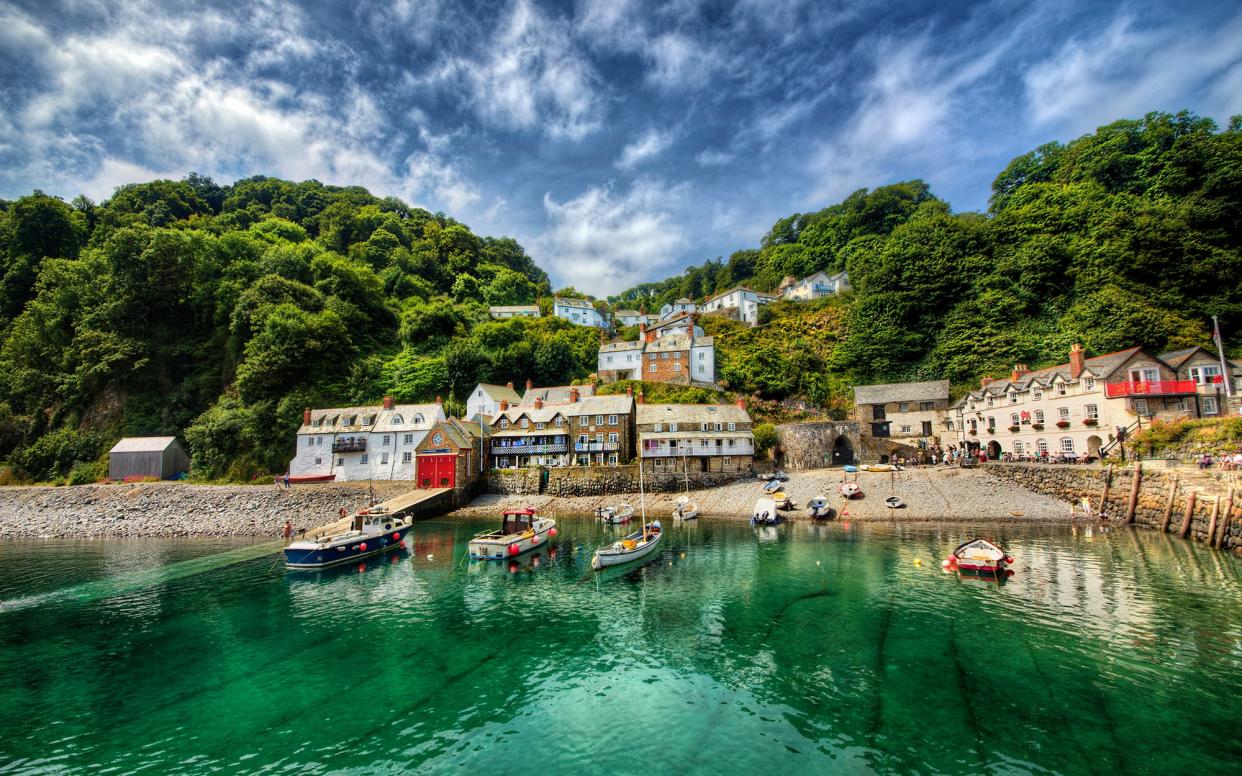
Holidays in Devon are simple, wholesome and old-fashioned. A visit here mixes two of life’s loveliest pleasures: delicious food and the great outdoors. Most visitors are drawn to the magnificent beaches on the north and south coasts, but inland has its appeal, too: Dartmoor and Exmoor are vast rocky plateaux offering solitude and big skies, while the gentler, Friesian-filled fields of mid-Devon hide clusters of thatched villages, meandering rivers and thickly wooded cleaves.
Devon folk make the most of the rich larder on their doorstep, with pasture-fed lamb, wild venison, pheasant and locally landed seafood all staples in restaurants. At weekends, market towns bustle with food, antique and craft stalls, while village fairs offer an eccentric taste of country living. Like anywhere it pays to research before you go. Get it right and a holiday in Devon will beat any foreign destination hands-down.
Explore our interactive map below for all the local highlights, and scroll down for our suggested day-by-day summary of the best things to see and do...
Day one
Morning
There’s no better way to clear away the cobwebs than with an exhilarating dip in the sea (take a wetsuit to reduce the initial chill); and if you go early, you’ll have usually packed beaches to yourself. With safe, shallow swimming from a perfect crescent cove, South Sands is my go-to destination, and you can warm up on the sunny terrace of beachside South Sands Hotel afterwards with a steaming mug of coffee and delicious brunch.
It’s a quick boat ride into Salcombe, or a short walk along the coastal path to National Trust property Overbeck’s where you can gawp at the town's best waterside views, framed through the sub-tropical foliage in their pretty gardens.
Afternoon
Invigorated from your morning swim, you'll be ready to take on one of Devon’s most spectacular stretches of coastline. Buy a picnic from beachside café The Winking Prawn on North Sands, and strike out for the eight-mile walk from Salcombe to Hope Cove, tracing jagged peaks, secluded sandy coves and bucolic Devonshire pastures dotted with doe-eyed cows and gambolling lambs. A tip: if you're actually staying at the South Sands Hotel, they will give you a free lift back from wherever you end up. Afterwards, return to the hotel’s terrace for a well-deserved drink – try Salcombe Gin which is distilled in a former sail loft.
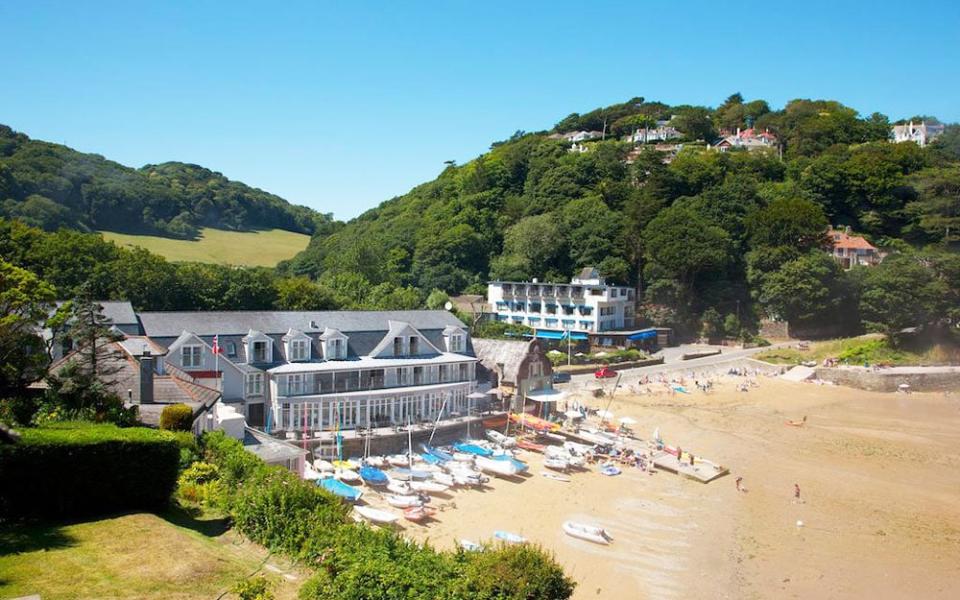
Late
You're spoilt for choice for dining in these parts, although most places are a drive away so book a taxi if you want to drink. Art Deco Burgh Island now offers black-tie dining every evening or informal dining in their Nettlefold restaurant. For pub grub, The Pilchard Inn is a weather-beaten smugglers’ pub which serves Devon real ales and good food alongside a hearty portion of piratical history. Cut off by tides twice a day, getting there is all part of the fun – a high-sided sea tractor ferries guests across the parting tides. For more recommendations of where to eat in Devon, see our guide.
A less formal dinner option is Millbrook, a cosy pub set on a tranquil creek in South Pool which serves exceptionally good modern British-style cuisine. For a rustic experience, The Beach House is a clapboard shack on South Milton Sands, offering superb seafood on communal tables overlooking Thurlestone sea arch.
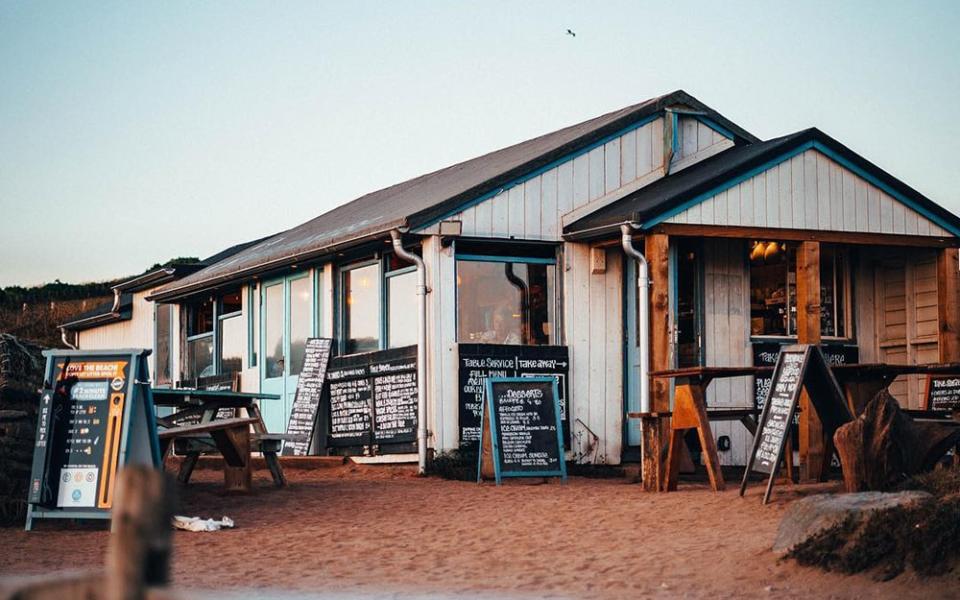
Day two
Morning
Head inland to the vast expanses of Dartmoor National Park, where you’ll enter a mythical world of Bronze Age hut circles, remote thatched hamlets, ancient glades and open moors roamed by wild horses and birds of prey. A road trip is the best way to see this wilderness; our favourite route starts in the idyllic thatched village of Lustleigh, where you can fortify yourself with tea and cake at the pretty Primrose Tearooms. From there, head to Grimspound, one of the most complete examples of the moor’s prehistoric villages and inspiration for Arthur Conan Doyle’s novel 'The Hound of the Baskervilles'.
Park at Two Bridges Hotel (01822 892300) for an easy hour-and-a-half walk to Wistman's Wood, an ancient dwarf-oak woodland where giant mossy boulders and lichen-encrusted trees look like a Lord of the Rings set. The next stop is to Dartmoor Prison Museum (Princetown; 01822 322130), which hosts a fascinating history of this Victorian prison, along with a gruesome collection of items confiscated from prisoners, including makeshift weapons and escape gear such as time-worn knotted sheets. For more recommendations of things to do in Devon, see our separate guide.
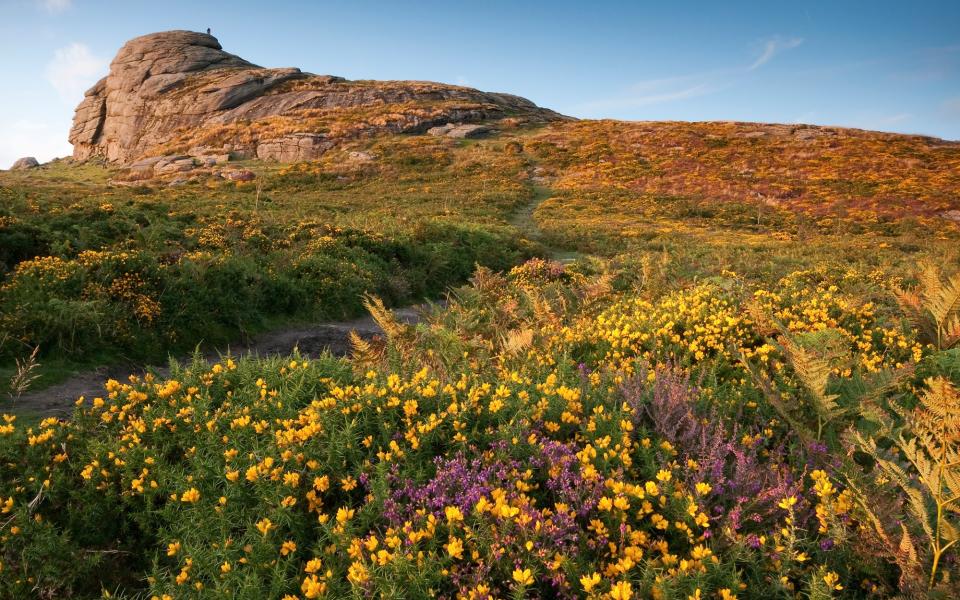
Afternoon
Drive to local beauty spot Dartmeet and through the exceptionally pretty thatched hamlet of Buckland-in-the-Moor, then on to remote Widecombe-in-the-Moor, where you can stop for a lunch and pint of Dartmoor real ale in the Rugglestone Inn's pretty garden, where ducks frolic in the stream.
The final stop on your Dartmoor scenic drive is Hound Tor, a jumble of towering granite boulders offering some of the best views. Look out for 'letterboxes' – Tupperware boxes containing messages hidden between the rocks by children. A gentle half-mile walk from the car park takes you to the top; continue 15 minutes further and you'll reach the remains of a medieval village.
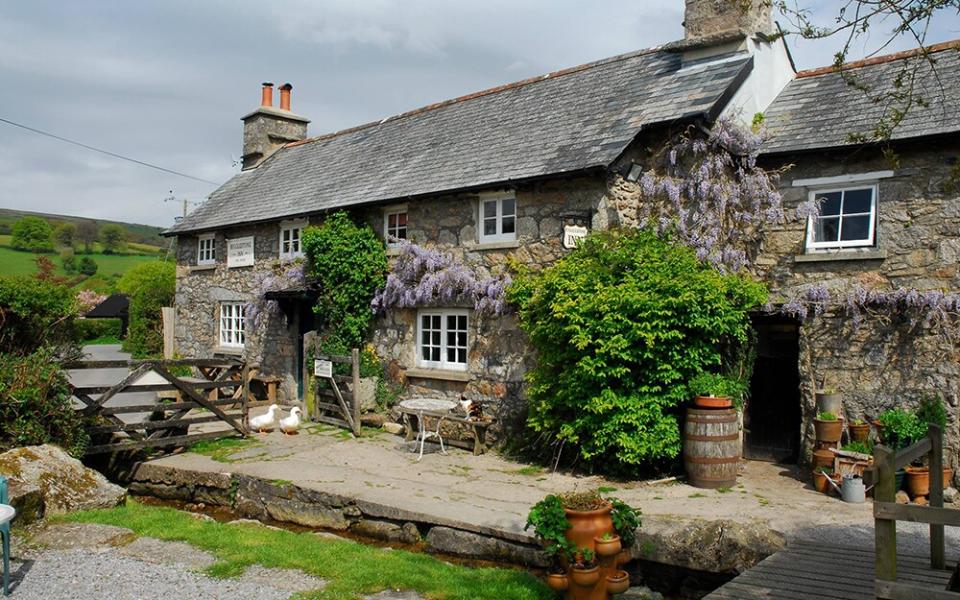
Late
Later, head to Bovey Castle, a grand estate near the thatched village of North Bovey, for a sundowner on the terrace overlooking Dartmoor. The hotel has two restaurants: the more casual (and cheaper) Smith’s Brasserie, which serves West Country staples such as burgers and fish and chips, or the glamorous fine-dining Great Western restaurant.
Otherwise, head to the Ring of Bells (01647 440375), a 13th-century coaching inn also in North Bovey, where you’ll rub shoulders with sheep shearers, bee-keepers and blacksmiths. For more pubs in Devon, see our guide.
Insider tips
Beaches
Devon’s beaches get crowded in summer, but if you’re prepared to walk even just a few minutes from a car park along the coastal path, you'll be rewarded with your own secret cove for the day. Elender Cove and Gammon’s Head Beach are two hidden beauties worth the walk. Check an Ordnance Survey map if you want to plan ahead. For more beach suggestions, see our guide.
Village watch
The stannary town of Ashburton is Devon’s best destination for antiques shopping. It’s also home to the moor’s hippest coffee shop, Rust and the Wolf, which serves fabulous brunches and coffee in a cool, East London-style setting.
Day trip
For a picnic with a difference, hire a private boat up the Dart with The Picnic Boat. You can stop off in little bays to go crabbing, or take a vineyard tour at Sharpham. There’s cover in case of bad weather.
Secret garden
Tucked away at the end of a long private drive, luxury hotel Endsleigh (Milton Abbot; 01822 870000), near Tavistock, may seem out of bounds to those on a budget. But its stunning Grade I-listed gardens, which sweep dramatically down to the River Tamar, are open to the public for a £5 donation, or free to visitors who book for lunch or one of their superb afternoon teas.
Did you know?
The Cornish pasty was actually invented in Devon. Despite the misnomer, the earliest recorded recipe for the pasty was discovered by archivists in in city records dating back to 1509. The reference to a “10d” pasty is included in an audited civic account book for Plymouth. Bakehouse Salcombe is the best place to pick one up.
Where to stay
Luxury living
Finally, a modern twist on a country house hotel that pulls off stylishness without sterility. Lympstone Manor is a sumptuous hotel from superstar chef Michael Caines, who has worked marvels with this vanilla ice cream-hued Georgian mansion. Food is spectacular: the fact that Lympstone Manor achieved a Michelin star within six months of opening says it all. Book a room with an outdoor bath overlooking the golden syrup sunsets of the Exe estuary.
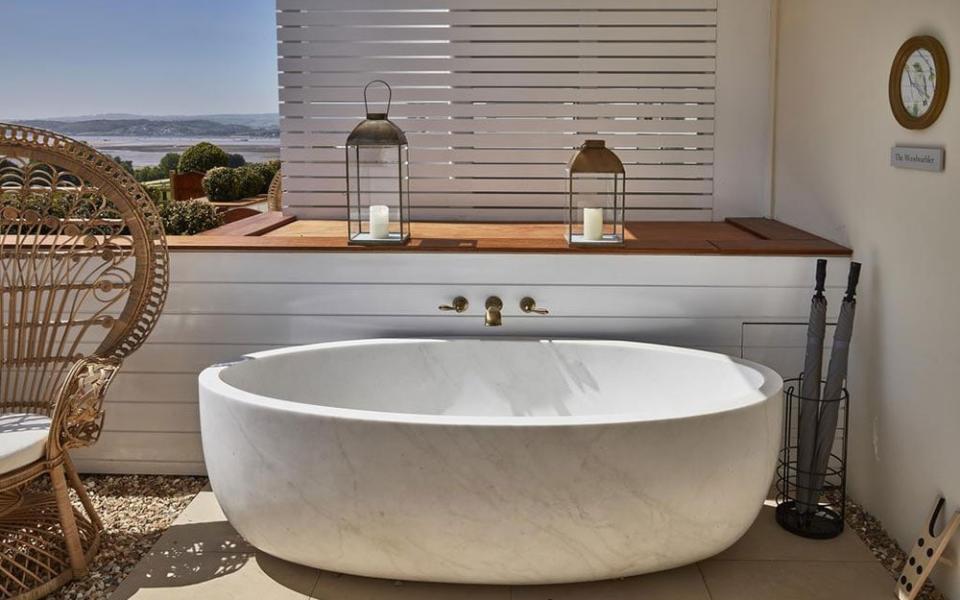
Boutique bolthole
South Sands is one of the few hotels in Devon to sit right on a beach near the yachtie town of Salcombe. It has safe swimming, soft sands and a sea tractor to local coves. On sunny days, the decked terrace is the place to hang out and gaze across beautiful views of sailing-boat studded waters, while rooms are close enough to the water that you can fall asleep listening to the swoosh of the waves.
Budget beauty
This charming historic Devonshire gastropub has a great seasonal menu, heaps of character and a lively and welcoming atmosphere. First licensed in 1320, The Cott Inn is the second oldest inn in the UK. Owners Mel and Mark have embraced its heritage while adding modern luxuries, offering a superb seasonal menu, heaps of character and a lively and welcoming atmosphere. Set in the peaceful village of Dartington, it’s walkable from the River Dart and just a mile from Totnes train station. See our guide to the best hotels in Devon.
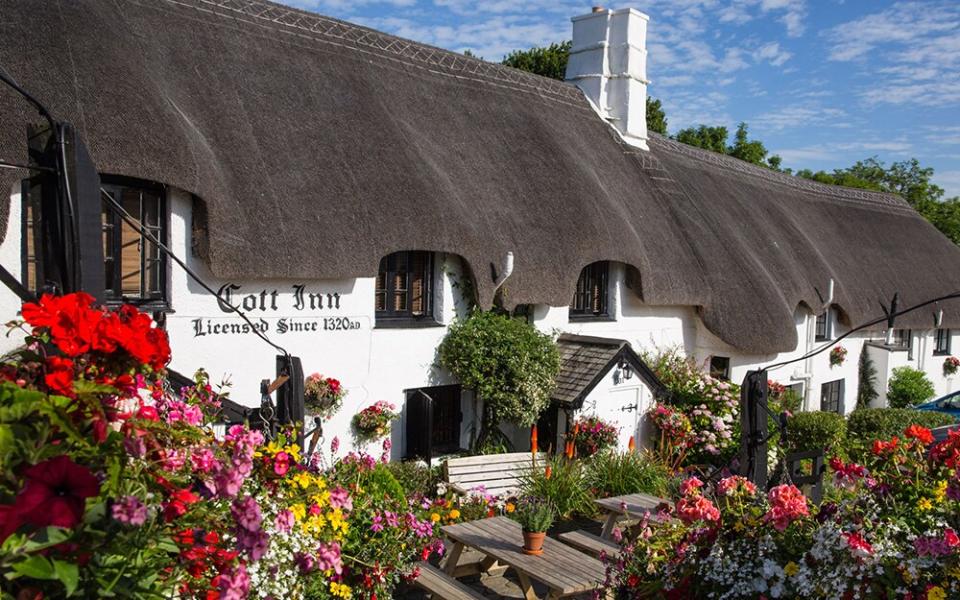
What to bring home
Homemade produce from a Devon honesty box. Our favourite doorstep offerings are Peter Hunt’s wildflower honey in North Bovey, and Marieke Ringel’s foraged fruit cordials, preserves and chutneys at the top of Pound Street in Moretonhampstead.
A piece you've made yourself on the Dartmoor Artisan Trail. This art and craft trail teaches visitors traditional Dartmoor skills, from making shoes and wooden spoons, to forging fire pokers and turning pottery.
When to go
Most of Devon’s main attractions, museums and National Trust properties open from the beginning of April to the end of October. If you can visit outside the school holidays, do: you’ll avoid M5 tailbacks and crowded beaches. If you can’t, avoid driving down on a Saturday, the changeover day for most holiday cottages.
After the Easter holidays, coastal paths are awash with spring flowers. In autumn, the turning of the colours on the moors is glorious, and in September and October, the sea is at its warmest and the beaches at their quietest. Visiting in winter has its benefits – among them, holing up by a fire in a cosy pub – but it has drawbacks too: most attractions are closed, bus services are limited and strong winds can make coastal walks dangerous.
Know before you go
Local laws and etiquette
Devon has a strong drinking culture: most pubs are at their busiest at 6pm when locals finish work. In remote areas, drink driving is more prevalent than in towns, but don’t be lulled into having 'one for the road' – it’s still illegal.
Obtain a tide table from a newsagent and time your beach visit accordingly: at high tide, beaches are crowded, thin strips of sand. Swimmers should beware of rip tides and strong currents, and only swim between the flags on beaches that have a lifeguard.
Ticks that carry Lyme disease can be a problem on the moors and in grassy and woodland areas of Devon. Wear insect repellant and tuck socks into long trousers to avoid being bitten.
Essential information
Predictably unpredictable, the weather in Devon can be sunny one minute and showery the next. Take gear for all weather.
Many rural areas of Devon don’t have mobile-phone reception so be prepared for a hike to the nearest farm if you run into trouble when you’re out and about.
You need nerves of steel to tackle Devon’s narrow country lanes, where stray sheep, speeding tractors and corkscrew bends make driving slow and precarious. Being confident at reversing into a tight space is a must: local etiquette dictates that the driver nearest a passing place pulls into it. Both drivers usually then exchange waves.
Author bio
Epic scenery, cosy pubs and a strong community spirit drew Suzy Bennett from East London to a remote village on Dartmoor over a decade ago. She travels everywhere with her dog, Ziggy.
Telegraph Travel's best hotels and holidays in Devon, tried, tested and recommended by our Devon experts.

